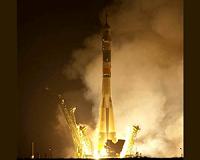 |
Tokyo (AFP) Dec 19, 2010 Despite its shoestring budget, Japan's space programme has boldly reached for the stars, pioneering solar-powered galactic travel, exploring a distant asteroid and planning a robot base on the Moon. The past year has seen Japan's space agency JAXA chalk up several world firsts, including the safe return of a deep-space probe that picked up asteroid dust from a potato-shaped space rock on an epic seven-year odyssey. The Hayabusa (Falcon) ended its five-billion-kilometre (three-billion-mile) mission when it burnt up on re-entry over the Australian outback. Hayabusa had already safely parachuted to Earth a disk-shaped container with the particles inside. Because asteroids are thought to date back to the dawn of our solar system, it is hoped the extra-terrestrial grains from asteroid Itokawa can help reveal secrets from as long as 4.6 billion years ago. The Hayabusa mission -- costing less than 200 yen (two dollars) per Japanese citizen over 10 years (20 billion yen) -- has boosted interest in the space programme, and in science and technology, said project leader Junichiro Kawaguchi. "Space development doesn't foster industries directly but it can nurture people who will contribute to industries in the future," he said. "It brought about an immensely bigger educational effect." Earlier this year the Japan Aerospace Exploration Agency (JAXA) also stunned earthlings everywhere when it sent a "space yacht" floating through the black void, without leaving a hint of a carbon footprint. The kite-shaped Ikaros -- short for Interplanetary Kite-craft Accelerated by Radiation of the Sun -- is propelled forward by sun particles bouncing off its fold-out wings, which are thinner than a human hair. There have been set-backs too. Last week the Akatsuki (Dawn) probe narrowly missed its entry point to the orbit of Venus, where it had been due to observe the toxic atmosphere and blistering volcanic surface for two years. Ground control put on a brave face after the mishap, vowing to try again when the probe and Venus have their next rendezvous in six years. If Akatsuki makes it, it will get a close-up glimpse of what is often called our sister planet -- similar in size and age to Earth but shrouded in sulphuric acid clouds and baking at 460 degrees Celsius (860 degrees Fahrenheit). JAXA's mission are far more ambitious than its budget would suggest. The agency has no manned missions and operated on 339 billion yen (four billion dollars) this fiscal year -- less than one-tenth of the NASA budget, and less than half the annual cost of Europe's space programme. Space officials are now fighting back against any further government belt tightening as they plan a follow-up probe to Hayabusa in 2014, which would explore an asteroid named 1999JU3. JAXA says it hopes its probe would find "organic or hydrated materials" on the asteroid, and to find out whether "there is any relation to life on Earth". The science and technology minister, Yoshiaki Takagi, last month vowed that "we will strive to secure the budget so that we can offer maximum support" for the Hayabusa-2 project. His ministry has requested a 100-fold boost to the research budget for Hayabusa-2 to some three billion yen next year. Prime Minister Naoto Kan sounded sympathetic when he said last month that Japan "must be committed" to space projects. In future the space agency may take on an even more ambitious task. An expert panel advising the minister for space development has called for sending a wheeled robot to the Moon in five years -- having first considered a two-legged humanoid, which was rejected because of the Moon's bumpy surface. It envisions building the first lunar base by 2020, which could be staffed by advanced robots, as a key stepping stone for Japan's space exploration, a field where Asian competition is heating up. "It is extremely important to probe the Moon... as we now see the dawn of 'the Age of Great Voyages' in the solar system," the panel said, pointing out that "China, India and other countries are aiming to probe the Moon." The government's Strategic Headquarters for Space Policy believes a successful space programme does much to lift Japan's profile on Earth. "Our country's space technology, its achievements and human resources are truly diplomatic resources that would boost our influence and position in the international community," it said in a policy report. "We will promote them as a source of our soft power."
Share This Article With Planet Earth
Related Links Space Tourism, Space Transport and Space Exploration News
 Paolo Nespoli Heads To ISS On MagISStra Mission
Paolo Nespoli Heads To ISS On MagISStra MissionParis, France (ESA) Dec 16, 2010 ESA astronaut Paolo Nespoli is on his way to the International Space Station with crewmates Dmitri Kondratyev and Catherine Coleman aboard their Soyuz spacecraft following liftoff from the Baikonur Cosmodrome in Kazakhstan at 20:09:25 CET today. Twenty main rocket nozzles beneath the venerable Soyuz launcher came to life at 01:09:25 local time at the cosmodrome and Soyuz TMA-20 rose into s ... read more |
|
| The content herein, unless otherwise known to be public domain, are Copyright 1995-2010 - SpaceDaily. AFP and UPI Wire Stories are copyright Agence France-Presse and United Press International. ESA Portal Reports are copyright European Space Agency. All NASA sourced material is public domain. Additional copyrights may apply in whole or part to other bona fide parties. Advertising does not imply endorsement,agreement or approval of any opinions, statements or information provided by SpaceDaily on any Web page published or hosted by SpaceDaily. Privacy Statement |